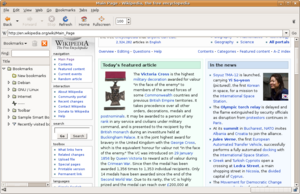Galeon

Galeon 2.0.4
|
|
| Original author(s) | Marco Pesenti Gritti |
|---|---|
| Developer(s) | Philip Langdale Tommi Komulainen Ricardo Fernández Pascual Yanko Kaneti Crispin Flowerday |
| Initial release | June 2000 |
| Last release |
2.0.7 / September 27, 2008
|
| Written in | C |
| Operating system | Unix-like operating systems |
| Type | Web browser |
| License | GNU General Public License |
| Website | galeon |
Galeon is a discontinued Gecko-based web browser that was created by Marco Pesenti Gritti with the goal of delivering a consistent browsing experience to GNOME desktop environment. It gained some popularity in the early 2000s due to its speed, flexibility in configuration and features.
The disagreement over the future of Galeon split the development team in 2002, which resulted in departure of browser's initial author and several other developers. This event marked the beginning of the browser's popularity decline, which led to its discontinuation in September 2008. Some of Galeon's features were subsequently ported to Epiphany (now called Web) – the descendant of Galeon.
Galeon made use of Gecko's features including configuration options and standards support. Apart from that, Galeon had several features that were uncommon in browsers at that time:
The project was started by Marco Pesenti Gritti with the goal of creating a web browser that would be fast and consistent with the GNOME desktop environment. The first public version (Galeon 0.6) was released in June 2000.
The first releases of Galeon were criticised for lack of such basic features as cookie and proxy support, though the browser added some features with every release. Version 1.2 of Galeon introduced many new features that drew attention of the general public.
At the time of Galeon's creation, the most popular Linux browsers, including Netscape and Mozilla, were large multi-functional programs. This made them slow to start and often impractical due to their high memory usage and processor requirements.Opera was somewhat faster, but it was proprietary software distributed in trialware and adware versions, both of which lacked some of the functionality of the Microsoft Windows version.
...
Wikipedia
